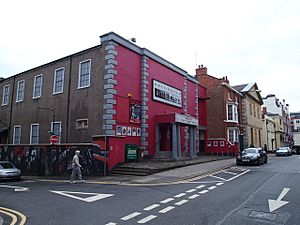George Street Particular Baptist Church facts for kids
Quick facts for kids George Street Particular Baptist Church |
|
|---|---|

Former George Street Particular Baptist Church, now an Arts Theatre
|
|
| 52°57′15″N 1°08′42″W / 52.95429°N 1.14489°W | |
| Location | Nottingham |
| Country | England |
| Denomination | Particular Baptist |
| Architecture | |
| Architect(s) | Edward Staveley |
| Completed | 16 August 1815 |
| Construction cost | £6,000 (equivalent to £373,240 in 2021) |
The George Street Particular Baptist Church was once a busy church in Nottingham, England. It served its community from 1815 until 1948. Today, this historic building has a new life. It is now known as the Nottingham Arts Theatre, a place for performances and creative arts.
Contents
A Look Back at Its History
How the Church Began
The story of this church started with a group of people who used to meet at the Friar Lane Baptist Church. As their group grew bigger, they needed a larger space. So, they decided to build a brand new church on George Street.
The new building was finished and opened its doors in 1815. It was designed by a skilled architect named Edward Staveley. The church was quite large, with enough seats for 1,000 people to gather. This same group also helped start another church, the Cross Street Baptist Church, in a nearby town called Arnold, Nottingham.
Changes Over Time
In 1847, something important happened: the church experienced a "schism." This means that some members of the church decided to leave and form their own separate group. They went on to create the Derby Road Particular Baptist Church.
Many years later, in 1948, the building changed its purpose. It was redesigned by A.H. Betts to become a Co-operative Theatre. This marked the end of its time as a church and the beginning of its role as an arts venue.
Past Leaders of the Church
The church had several ministers who led the congregation over the years. Here are some of them:
- John Jarman served from 1803 to 1830.
- James Edwards took over in 1830.
The Church Organ
The George Street Particular Baptist Church was special for another reason. It was the very first Baptist church in Nottingham to have an organ! They bought this musical instrument in 1847.
The organ was built by a company called Messrs. Bevington and Sons from London. It cost £220 at the time. It's thought that the church leaders might have been inspired by a similar organ. That organ was built by the same company just one year earlier for St. Paul's Church, which was right across the street.
 | Sharif Bey |
 | Hale Woodruff |
 | Richmond Barthé |
 | Purvis Young |

